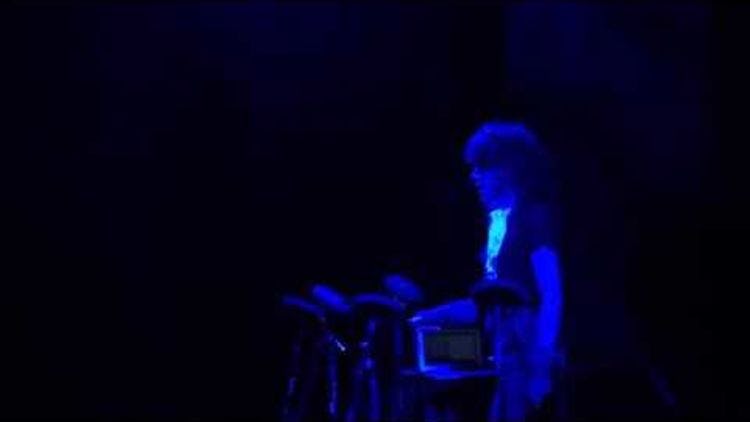With arched ceilings and marble floors, ISSUE Project Room set the scene for Lainie Fefferman's performance White Fire, an electroacoustic reflection on heroines from the Hebrew Bible. Fefferman, an assistant professor in Stevens' Music and Technology program, wove her voice in and out of the sounds of her electronics, exemplifying the technical and creative expertise that she brings to the College of Arts and Letters.
Asked why she chose to use technology, Fefferman's reply was simple. "That's kind of like asking 'why a guitar?' she said. "Different laptop-centered technologies have been the instruments I've used most and felt the most satisfied with since I started performing my own compositions about ten years ago."
Yet, this performance introduced new and advanced technology, developed with the support of the non-profit ISSUE and the renowned Nokia Bell Labs. Referred to as a "multichannel live-streaming network," the tool allowed Fefferman to make use of participating audience members' phones. As Fefferman sang and drummed away in front of the crowd, sound also resonated from the cells' speakers, creating an encompassing experience.
For Fefferman, the night was a bit of an actualized dream. "As an experimental musician in Brooklyn, Issue Project Room has been a center for my community for decades and I am so proud to have my work featured there," said Fefferman. "[Nokia] Bell Labs figured largely in my house growing up – I come from a family of mathematicians and scientists, all of whom instilled in me a profound respect and awe for the brilliant creativity and innovation that has come out of [Nokia] Bell Labs."
This collaboration with Nokia Bell Labs also provided an exciting opportunity for Danielle McPhatter, a music and technology alumna who was working there as an intern. McPhatter formed a partnership with MIT student Madeline Wong, and together they engineered the multichannel streaming network. "We split the duties into two domains: the web interface, and the audio streaming solution, which I handled," said McPhatter. "My job was to find a creative solution that could allow Lainie to send multichannel audio from her laptop to the smartphones of select members in the audience via the web interface, all while applying three key principles to the solution: modularity, flexibility and affordability."
"Danielle is such a superstar!" said Fefferman following the performance. "I already knew Danielle's creativity, independence, and drive from her short time as my student, but it was such a distinct pleasure to work with her and to rely on her deep knowledge as a collaborator."
So, how was this brand new equipment used? Fefferman tapped into the network to share the story of Jezebel, the once queen of Isreal, who millennia later became a symbol of harlotry, rather unjustly. "What stuck out to me first about Jezebel's story was that she had such a large and varied role as queen of Israel, but that none of that story had to do with sexuality," said Fefferman. In more modern times though, Jezebel's use of makeup was misconstrued and misrepresented, and her name has become synonymous to the harshest words used against women.
Thus, as Fefferman told Jezebel's story, the phones sprang into action, echoing these harsh slurs. It was bold, and it was effective. "It felt weirdly empowering for me as a performer to deploy those words," said Fefferman. "Generally, I feel powerless when I see those words applied to women, but in reappropriating them to illustrate my point, however clearly or opaquely it came across, I felt ownership of them in a way I haven't before."
In the end, Fefferman hopes the night and her songs about these heroines sparked conversation. "I hope these stories, that shape so much of our current American culture, get talked about with more curiosity, openness, and depth."



